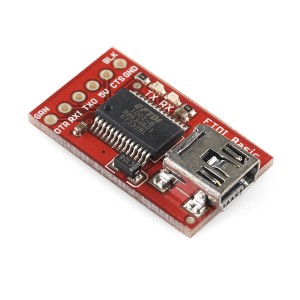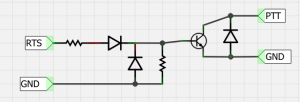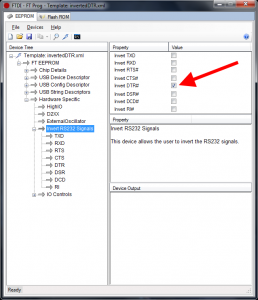Tag Archives: computers
I decided to move all my radio stuff from my desktop to my laptop for now. My desktop has never been a reliable computer – there’s something wrong with it that causes it to stall (and whatever it is, it’s hardware and not OS, as it has done the same with XP or Mint). It also goes SLOOOOOOOOOOOW. In fact, it goes so slow, I tend to boot it at least 10 minutes before I need it, and it was degrading to the point where it wasn’t even ready then.
So, one thing I ~need~ want to be able to do is digital modes like RTTY (I know many hate it, but I do enjoy RTTY contests). The problem I ran into is not a new one: there’s no serial port on my laptop, meaning my old way of triggering my radio’s PTT is now a useless group of components.
I happen to have a Sparkfun FTDI Breakout board sitting nearby. It has a damaged trace to the 5V output caused by the fact that my soldering iron is an old Radio Shack 45W pencil (which puts out far too much heat for many boards). I had set it aside with the intent to use a wire jumper to fix the problem, but after getting it back off the electronic triage shelf I realized that everything worked except the 5V output. The module looks like this (picture credit from Sparkfun):
I first wired it in with my transistor switch to look something like this:
It didn’t work.
I started to investigate. I noticed that DTR, RX1, TXO, and CTS were all 5V, but DTR would drop to 0V when the DTR was activated via software.
So I did a little research. FTDI makes their boards customizable, so I looked into the software from FTDI’s website and found a configuration utility called FT_PROG. From this utility, I was able to read the chip and then re-write the chip to invert the DTR signal. Note the screenshot below:
This allows me to use the FTDI board with an optoisolator and trigger the PTT. The schematic is below:
So now I just have to fix the USB soundcard issue…
-73-
Jeff Davis, KE9V did a great post about mailing list etiquette. That was a subject one day this past week on my 2m repeater this past week after a pissing match developed on the HTX-HF_TECH group. I highly recommend reading it. You can find it right here.
-73-
A few days ago, I tweeted and posted to Google+ “I’m going to do a blog post on Hamr + Linux. I need to help dispel the myth of “there’s not a lot of hamr software for Linux””. This was started because of a conversation on the local 2m repeater and others making that claim. I typed this knowing full well that there were already resources out there.
There is A LOT of software for amateur radio. It is listed on http://radio.linux.org.au/?sectpat=All&ordpat=title. There’s another list at http://www.dxzone.com/catalog/Software/Linux/. The problems are that some of it isn’t very good, and some aren’t being updated anymore.
So for starters, what distro should you be using? This is really a personal question, and I’m not going to answer it. LeRoy, KD8BXP has done an excellent write up about 19 different Linux distros at http://kd8bxp.blogspot.com/2011/10/follow-up-on-19-different-linux-distros.html. He doesn’t answer that personal question, either, but his blog post will help you answer that question. I use Mint Linux for now. I’ve used and enjoyed Fedora and Ubuntu, but I understand the latest version of Ubuntu has a few issues.
Other resources include Linux in the Ham Shack Podcast (at the time of writing, this hasn’t been updated for a few months) (which just got updated with 3 new shows and they’re doing another as I type!) and Resonant Frequency Podcast.
I will be looking at the following subjects, and probably in this order (or close to it):
- Logging for General Operating
- Digital Modes
- Soundmodem (used for Packet and APRS)
- APRS
- Contest Logging
- Satellite Pass Prediction
- Antenna Analysis
- Propagation Prediction
- Packet
- Software Defined Radio*
- USB Rig Control*
For each of these, I will look into and give a quick evaluation of all up-to-date packages I can find, and then give a recommendation and detailed “how to use”. Starred items are items that require me to get or buy something. Because of that, these may be pushed until I have the items I need or advanced when I get the items (I will update this list as needed).
For now, I bid thee 73s. If you want to influence my order of things above or make sure I mention something (software, etc) or even a concept (like if you really want me to talk about SSTV), feel free to leave it in the comments section below.
-73-




